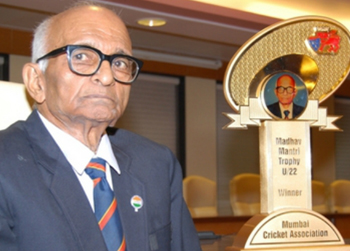New Delhi, Jul 8: After a hiatus of 116 days, international cricket will be resuming today as England and West Indies lock horns in a three-match Test series.
Since March, no international cricket has been played due to the coronavirus pandemic. Because of this virus, whole sporting action across the world came to a standstill.
Australia and New Zealand had played the last international cricket match on March 13 behind closed doors, but the remaining two ODIs of this particular series were cancelled due to COVID-19.
India and South Africa's ODI series also met the same fate due to the pandemic.
It was looking as if it will take a while for sports to come back, but slowly and steadily, all different sports have managed to get into gear and provide fans some respite in these turbulent times.
German football league Bundesliga was the first one to come back, and the organisers set the template as to how to go about conducting tournaments behind closed doors, keeping all safety protocols in check.
Soon after, La Liga, Premier League, and Serie A followed and all major football leagues came back on the television screens across the globe. Formula One kickstarted last week with the Austrian Grand Prix and now it is the time for cricket to resume.
The series between England and West Indies will be played behind closed doors and the matches will be played in Southampton and Manchester. This will be the first time in the 143-year long history of Test cricket that the matches will be played without no crowds.
The England-Windies Test series will be held at Hampshire's Ageas Bowl and Lancashire's Emirates Old Trafford, which have been chosen as bio-secure venues. After the series against West Indies, England would also lock horns with Ireland in three ODIs and Pakistan in three ODIs and as many T20Is.
However, the series against West Indies will be followed closely across the world as all other boards would be looking to see as to how cricket series can be scheduled in their own backyard with the current scenario regarding coronavirus.
The dates for three Tests against West Indies are:
First Test: July 8-12 at Ageas Bowl
Second Test: July 16-20 at Emirates Old Trafford
Third Test: July 24-28 at Emirates Old Trafford
Windies side had arrived in the UK in mid-June and the entire camp had to quarantine themselves for 14 days at Manchester.
For the entire tour, the West Indies squad will live, train and play in a 'bio-secure' environment in England as part of the comprehensive medical and operations plans to ensure player and staff safety.
The bio-secure protocols will also restrict movement in and out of the venues.
Both England and West Indies have played intra-squad practice matches to get some cricketing form back.
While England played their practice match in Southampton, Windies played theirs at Manchester.
West Indies will be led by Jason Holder, while Ben Stokes would captain England in the first Test as regular skipper Joe Root has left the bio-secure bubble to attend the birth of his second child.
England squad for the first Test: Ben Stokes (captain), James Anderson, Jofra Archer, Dom Bess, Stuart Broad, Rory Burns, Jos Buttler, Zak Crawley, Joe Denly, Ollie Pope, Dom Sibley, Chris Woakes, Mark Wood.
West Indies squad for the first Test: Jason Holder (captain), Jermaine Blackwood, Nkrumah Bonner, Kraigg Brathwaite, Shamarh Brooks, John Campbell, Roston Chase, Rahkeem Cornwall, Shane Dowrich, Shannon Gabriel, Chemar Holder, Shai Hope, Alzarri Joseph, Raymon Reifer, and Kemar Roach.
As safety precautions against the coronavirus, the International Cricket Council (ICC) has also brought about some changes to the playing conditions. The new guidelines include the ban of saliva to shine the ball and allowing replacement of players displaying symptoms of COVID-19 during a Test match.
Players will not be permitted to use saliva to shine the ball. If a player does apply saliva to the ball, the umpires will manage the situation with some leniency during an initial period of adjustment for the players, but subsequent instances will result in the team receiving a warning.
A team can be issued up to two warnings per innings but repeated use of saliva on the ball will result in a 5-run penalty to the batting side. Whenever saliva is applied to the ball, the umpires will be instructed to clean the ball before play recommences.
Also, the requirement to appoint neutral match officials has been temporarily removed from the playing conditions for all international formats owing to the current logistical challenges with international travel. The ICC will be able to appoint locally based match officials from the ICC Elite Panel of Match Officials and the ICC International Panel of Match Officials.
Moreover, teams will be allowed to replace players displaying symptoms of COVID-19 during a Test match. In line with concussion replacements, the match referee will approve the nearest like-for-like replacement. However, the regulation for COVID-19 replacements will not be applicable in ODIs and T20Is.
The ICC had also confirmed an additional unsuccessful DRS review for each team in each innings of a match, keeping in mind that there may be less experienced umpires on duty at times.
This will increase the number of unsuccessful appeals per innings for each team to three for Tests and two for the white-ball formats.
The first Test between England and West Indies gets underway later today from 3:30 PM IST.
 Mumbai, May 23: Madhav Mantri, who was India’s oldest living Test cricketer at 92 years and 244 days, passed away of a heart attack at Leelavati Hospital on Friday morning.
Mumbai, May 23: Madhav Mantri, who was India’s oldest living Test cricketer at 92 years and 244 days, passed away of a heart attack at Leelavati Hospital on Friday morning.




Comments
Add new comment